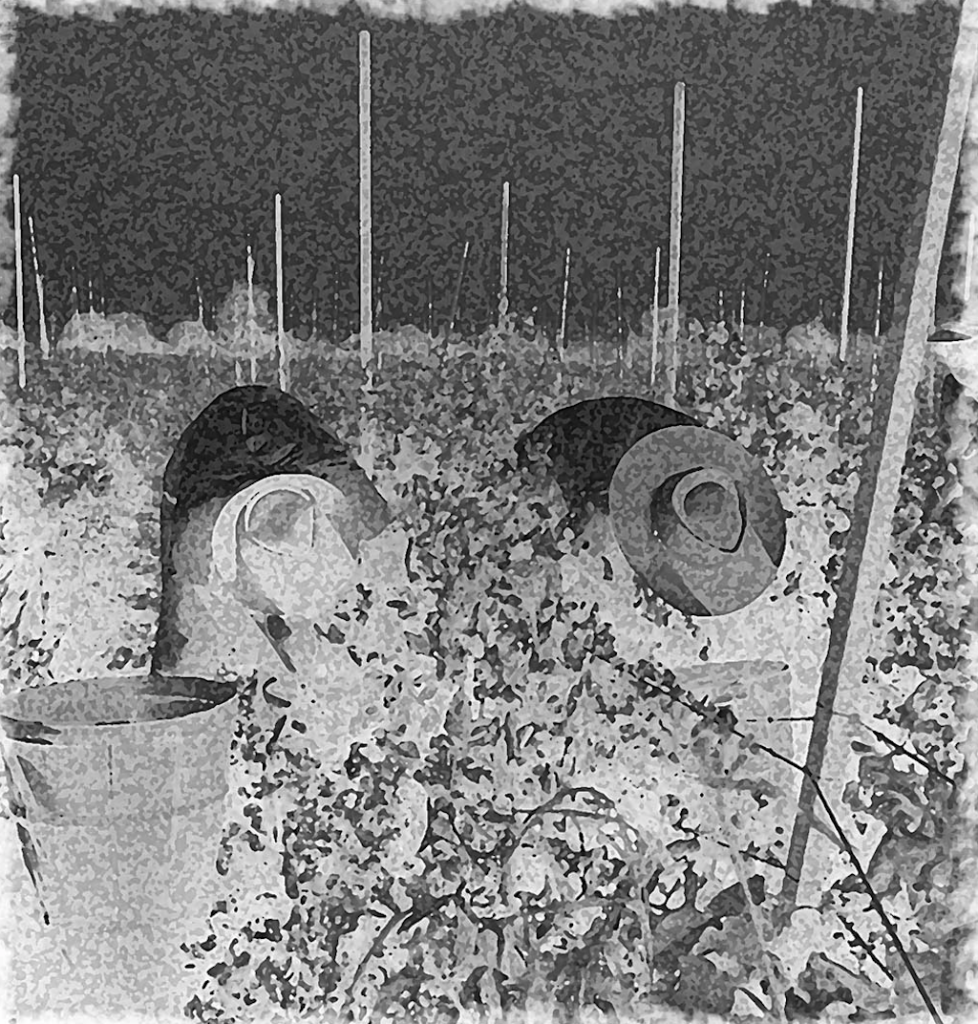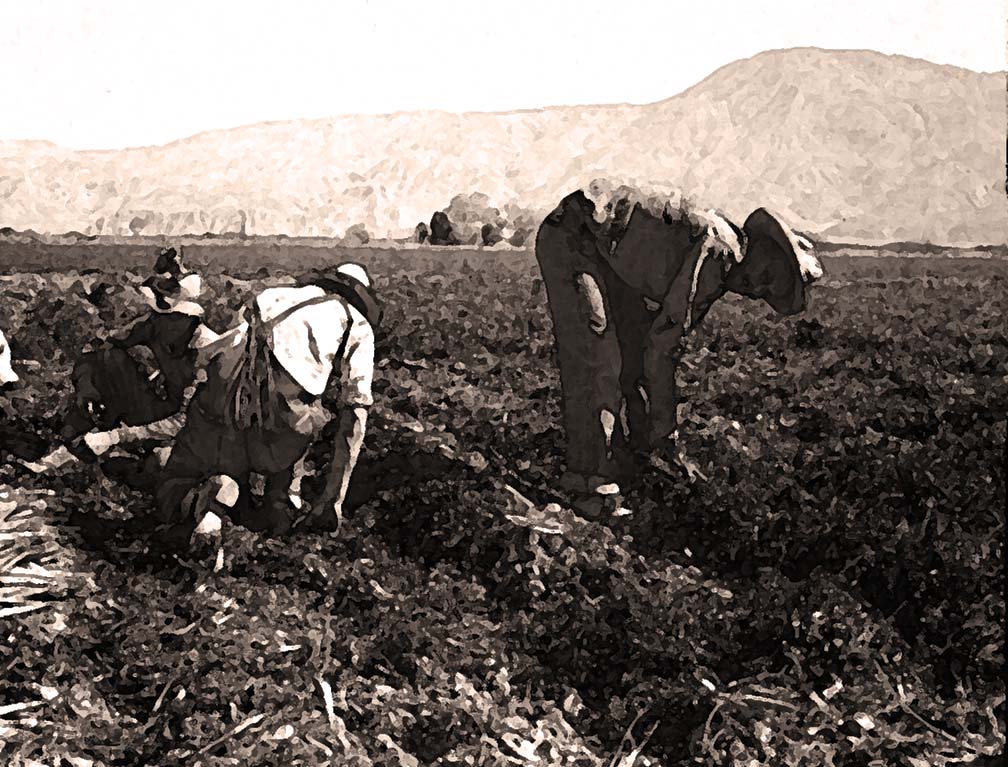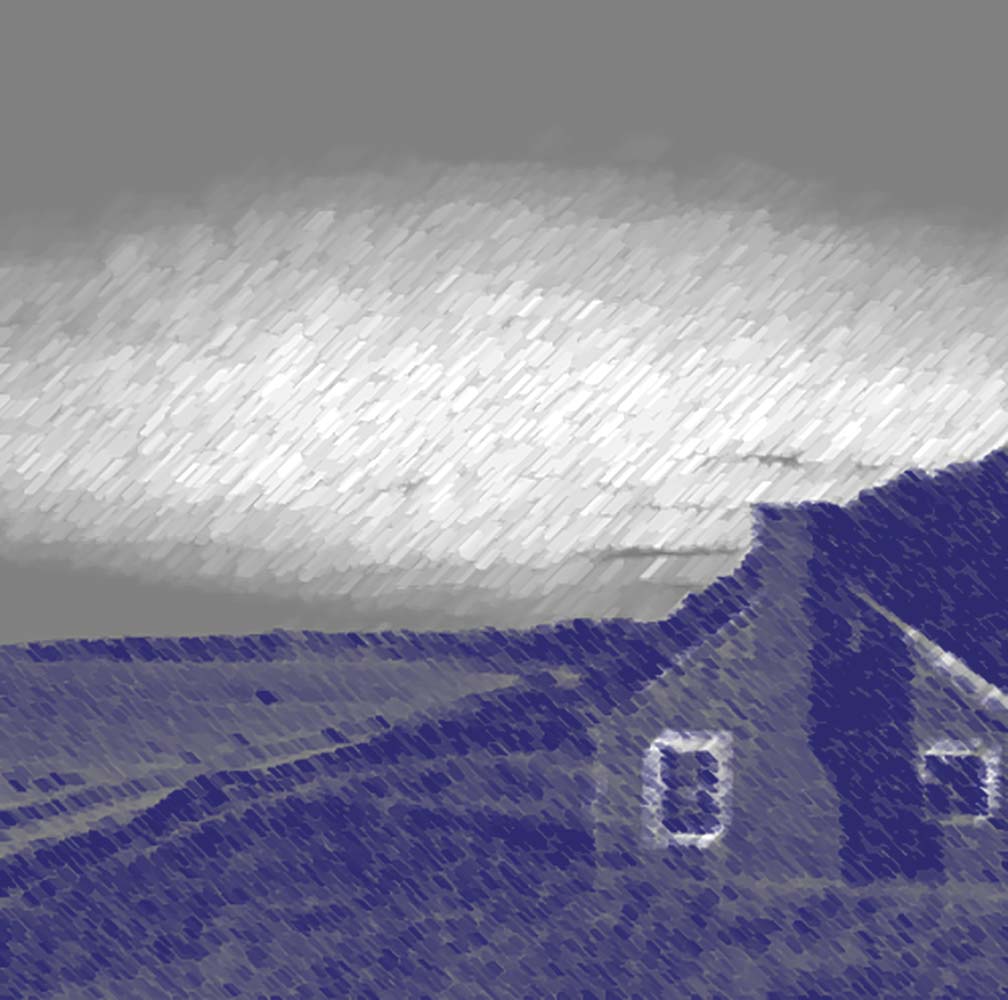In the middle of that year when we were picking peas on the hillside, I noticed the school children playing with their teacher in the sun. It was my first time to see her, a young woman of about twenty-five, with brown hair and a white dress spotted with blue. The blue sky seemed to absorb the white color of her dress, but from where I stood she appeared all clothed with light blue. The blueness of the sea at the back of the schoolhouse also enhanced the blue dots of her dress. But my eyes were familiar with the bright colors on the hillside, the yellowing leaves of the peas, the sprouting green blades of the summer grass, the royal white crowns of the eidelweiss, the tall gray mountains in the distance, and the silent blue sea below the clear sky.

I had arrived in America, the new land. three months before and had come to this farming town to join friends who had years ago left the Philippines. I had come in time to pick the summer peas. I had been working for over a month now with a crew of other Filipino immigrants who followed the crops and the seasons. At night when our work was done and we had all eaten and scrubbed the dirt off our bodies, I joined them in my dress suit and went to town to shoot pool at a familiar place. I observed that the older men went to the back of the poolroom and played cards all night long. In the morning they went to the field sleepily and talked about their losses and winnings all day. They seemed a bunch of contented workers, but they were actually restless and had no plans for the future.
Then I saw the children. They reminded me of a vanished time. I used to stop at my work and watch them singing and running and screaming in the sun. One dark-haired boy in particular, about eight, brought back acute memories of a childhood friend who died a violent death when I was ten. We had gone to the fields across the river that afternoon to fly our kites because it was summertime and the breeze was just strong enough to carry them to high altitudes.
Suddenly, in the midst of our sport, a ferocious carabao broke loose from its peg and came plunging wildly after us, trapping my friend and goring him to death. That night when I went to see him, and realized that he was truly dead, I ran out of the house and hid in the back yard where the moonlight was like a silver column in the guava trees. I stood sobbing under a guava, smelling the sweetness of the papaya blossoms in the air. Then suddenly nightingales burst into a glorious song. I stopped crying and listened. Gradually I became vaguely comforted and could accept the fact that my friend would not come back to life again. I gathered an armful of papaya blossoms and went back into the house and spread them over the coffin. I returned to the guava grove and listened to the nightingales sing all night long.
So now this dark-haired boy in a land far away, many years afterward, stirred a curiosity for the unknown that had been dimmed in me by time. I walked to the schoolhouse one morning and stood by the fence. The children ran to me, as if they knew me. I cannot now remember my exact feeling when they reached out their little hands to me. But I know that I suddenly started gathering the red and yellow poppies growing abundantly on the hillside. Then the teacher came out on the porch and called the children back to their classes.
I returned to my work, watching the schoolhouse. In the early afternoon when the children had gone home, I saw the teacher walking toward the hill. She came to me.
“Were you the boy that was at the schoolhouse this morning?” she asked.
“Yes, ma’am,” I said.
“How old are you?”
I told her. She looked toward my companions for a moment, who had all stopped working to listen to her. There was something important she wanted to say, but she waited for a moment, deciding silently and intelligently.
“You are too young to be working,” she said finally. “How far have you gone in school?”
I was ashamed to admit it, but I said:
“Third grade, ma’am.”
“Would you like to do some reading with me?”
“I’d love to, ma’am,” I said softly. I looked at my companions from the corners of my eyes, because they would ridicule me if they knew I wanted some education. I never saw any reading material at our bunkhouse except the pictures of semi-nude women in movie magazines. “I’d love to study some, ma’am,” I said. “But I can read only a few words.”
“Well, I’ll teach you,” she said. “What time do you go home?”
“Six o’clock, ma’am,” I said.
She said, “I’ll be at your bunkhouse at eight. That will give you two hours for dinner and a bath. Tell your friends to be ready, too.”
“Yes, ma’am,” I said. “I will tell them. Some of them went to high school in the Islands, but most of us stopped in the primary grades.”
“I’ll teach those who are willing,” she said. “So be ready at eight sharp.”
I watched her walk slowly down the hill. When she reached the highway at the foot of the hill, I waved my hand at her. She waved back and walked on. She drove away in her car, and when she was gone, I went on working quietly. But my companions taunted me. Some of them implied dark things that made me stop picking peas, but I did not understand then. When they finally stopped shouting at me, I resumed my work thinking of books I would like to read.
The teacher came at the appointed time. She had put on a pair of corduroy pants and an unpressed blue shirt. It was my first time to see a woman dressed like a man. I stole glances at her every time she turned her face away. She brought a story book about ancient times which she read slowly to me. But I was disappointed because my companions did not want to study with me. I noticed that five stayed home and played poker; the others went to town to shoot pool. There was one in the kitchen who kept playing his guitar, stopping only now and then to listen to what we were reading. About ten o’clock in the evening the teacher closed the book and prepared to go. I took her to the door and looked outside where the moon was shining brightly. The grass on the hill was beautiful, and the calm sea farther away was like a polished mirror, and the tall mountains on the horizon were like castles.
“Shall I walk you to the road, ma’am?” I asked.
“Thank you,” she said. “I love to walk in the moonlight.”
When she was at the gate, I ran after her.
“What is your name, ma’am?” I asked.
“Helen O’Reilly,” she said. “Good night.”
I watched her walk away. She stopped under the tall eucalyptus trees on the highway and looked around the wide silence. After a while she lighted a cigarette and climbed into her car.
Miss O’Reilly came to our bunkhouse every evening after that night. She read stories of long ago, and pages from the history of many nations. My companions slowly joined our course and in two weeks only three of the whole crew stayed away.
She took a great interest in her work. After a while she started talking about herself and the town she had come from and about her people. She had been born in a little town somewhere in the Northwest. She had come from a poor family and supported herself through college. Before she was graduated the depression came. When she was offered a teaching job in a rural community in California, she accepted it, thinking that she could go on with her studies when she had saved enough money.

Miss O’Reilly was a good teacher. We started giving her peas and flowers that we picked on the hillside when we were working. Once we thought of buying her a dress, but one of the older men said that it was improper. So we put the money in a large envelope and gave it to her when she came one evening. She did not want to accept it, but we said that it was a token of our gratitude. She took it then, and when she came again she showed us a gabardine suit that she had bought with it.
We were all very happy after that. On the hillside, when we were picking peas, we sometimes stopped and considered the possibility of giving her a party at our bunkhouse. But one evening she came to tell us that some organization in town had questioned her coming to our bunkhouse. She told us to go to the schoolhouse when our work was done and study there like regular pupils.
I could not understand why any organization would forbid her to work where she pleased. I was too new from the Islands, too sheltered within my group of fellow Filipinos to have learned the taboos of the mainland, to have seen the American doors shut against us. But I went to the schoolhouse every night with my companions and started writing short sentences on the blackboard. I stood there and looked out of the window. I saw the silent sea and the wide clear sky. Suddenly I wrote a poem about what I saw outside in the night. Miss O’Reilly started laughing because my lines were all wrong and many of the words were misspelled and incorrectly used.
“Now, now,” Miss O’Reilly said behind my back, “it’s too soon for you to write poetry. We will come to that later.”
I blushed.
“What made you do it?” she asked.
“I don’t know, Miss O’Reilly,” I said.
“Did you ever read poetry before?”
“No, Miss O’Reilly,” I said. “I didn’t even know it was poetry.”
She looked at me with some doubt. Then she went to her table and started reading from the Bible. It was the Song of Solomon. I liked the rich language, the beautiful imagery, and the depth of the old man’s passion for the girl in the vineyard.
“This is the best poetry in the world,” Miss O’Reilly said when she finished the chapter. “I would like you to remember it. There was a time when men loved deeply and were not afraid to love.”
I was touched by the songs. I thought of the pea vines on the hillside and the silent blue sea not far away. And I said to myself: Someday I will come back in memory to this place and time and write about you. Miss O’Reilly. How gratifying it will be to come back to you with a book in my hands about all that we are feeling here tonight!
Miss O’Reilly shoved the Bible into my pocket that night. I read it over and over. I read all the school books also. I was beginning to think that when I could save enough money I would live in another town and go to school. We still had the peas to pick and after that the tomatoes on the other side of the hill.
Then it was that Miss O’Reilly told us she was forbidden by the school board to use the building at night. The directive was for us, of course. Miss O’Reilly did not tell us that, but some of my companions knew what it was all about. When she invited us to go to her boarding house, only a few of us went.
“Come one by one in the dark,” she advised. “And go up the steps very quietly.”
“All right, Miss O’Reilly,” I said.
So we went to her room at night where we read softly. She told us that there was a sick old woman in the house. One night a man knocked on the door and asked Miss O’Reilly to step out in the hallway for a moment. When Miss O’Reilly came back to the room, I saw that she was perturbed. She looked at us in a maternal way and then toward the hallway with a forgiving look. We resumed our reading, and at our departure Miss O’Reilly told us not to mind anything.
I went again the following night. But I was alone. My companions had dropped out. Miss O’Reilly seemed about to tell me something, but she let it drop. I forgot about her uneasiness as we read to each other, but when I left and she accompanied me to the door, she turned suddenly and ran back to her room. I thought she had forgotten to give me
something, but when her lights went out I went on my way.
I had gone two blocks when four men approached me in the dark street. Two of them grabbed me and pushed me into a car. Then they drove for several blocks, turned to a field of carrots, and stopped under a high water tank. They got out of the car then and started beating me.
I tried to defend myself, but they were too many. When I had a chance, I started to run away, but a man jumped into the car and drove after me. I fell down when the car struck me. They all came and started beating me again. I could fight no more. I lay on my stomach and rolled when they kicked me. Once, when I was losing consciousness, I felt the hard heel of a shoe on the back of my head. Then everything plunged into darkness.
When I regained my senses, it was past midnight. The sky was clear as day. I did not know where I was for a moment. I saw the full moon hanging languidly far away. I opened my swollen eyes’ a little and the golden lights of several stars appeared in the depths of the sky. Slowly I realized what had happened. And then, when I understood it all, tears rolled down my cheeks and fell on the cool carrot leaves underneath my head.
It was the final warning. When I reached our bunkhouse, my companions were crowded into the kitchen reading a roughly written message that had been thrown into the place that night. The men who had beaten me had driven to our bunkhouse when they were through with me. The message stated they would burn our bunkhouse and drive us out of town if we saw the school teacher again.
One of the older men, who had known darker times in this land, took me by the arm and secreted me in the outer house, saying, “I could have told you these things before, but I saw that you were truly interested in educating yourself. I admired your courage and ambition. May I shake your hand?”
I said, taking his hand, “Thank you.”
“Some men are good, but others are bad,” he said again. “But all evil is not confined in one race of people, nor all goodness in another. There is evil in every race, but there is also good in every other. And yet all goodness belongs to the whole human race.”
Then I knew why Miss O’Reilly had come to our bunkhouse and taught us. But I did not go to her boarding house for a week. I was afraid. When my bruises were well enough, I went to town, but Miss O’Reilly’s room was closed and dark. I thought she had gone to a movie; I waited almost all night.
But she did not appear that night. Nor any other night. Then I knew that she had moved to another house, because during the day I saw her in the schoolyard. Sometimes she stopped and waved her hand toward us. I waved mine, too. And that went on for days. Then she disappeared.
I often wondered what had happened to her. Another teacher took her place.
But the new teacher did not even notice us. So at night and on our days off we went to town in separate groups looking for our teacher. But we did not find her. We finished picking the peas and transferred to the other side of the hill to harvest the tomatoes. Now and then we stopped to look toward the schoolhouse, but Miss O’Reilly did not come back. Then one day in June the schoolhouse closed its door and we watched the children slowly walk home. It was the end of another school year, but it was still only the beginning of my first year in the new land.
One day, toward the end of the tomato season. Miss O’Reilly appeared. She looked a little thinner. I noticed a scar on her left wrist.
“I was in the hospital for a while,” she greeted us. “I have been ill.”
“You should have let us know,” I said. “We would have sent you flowers from the hill.”
“That is nice of you,” she said. “But now I am leaving. To the big city.”
“Will you come back some day. Miss O’Reilly?” I asked.
“I hope so,” she said. “But when you come to the big city, try to look for me. I think I’ll be there for a long time.”
“Are you going to teach in another school?”
“I don’t know,” she said. “But I will try to find an assignment. Yes, there must be a vacancy somewhere.” And then, kindly, she put her hand on my head, saying, “I will go on teaching people like you as long as the grass shall grow.”
It was like a song. I did not know then what she meant, but the words followed me down the years. That night we gave Miss O’Reilly a party at our bunkhouse. We roasted a pig in the open air. The men tuned up their musical instruments and played all night long. The moon was up in the sky and the sea was silent as ever. The tall mountains were still there; above them stars were shedding light to the world below. The grass on the hill was beginning to catch the morning dew. And then we took Miss O’Reilly to her car and bade her good-bye.

I wanted to cry. Tenderly she put her hand on my head.
“Remember,” she said, “when you come to the city, try to look for me. And now, good night to all.”
And she drove away. I never saw her again.
I went away from that town not long afterward and worked in many big cities. I would work for a long time in one place, but when the leaves of the trees started to fall, I would pack my suitcase and go to another city. And the years passed swiftly.
One morning I found I had been away from home for twenty years. I saw the grass of another spring growing on the hills and in the fields. And the comforting thought came to me that I had had Miss O’Reilly with me all the time, there in the broad fields and verdant hills of my new home, my America.


